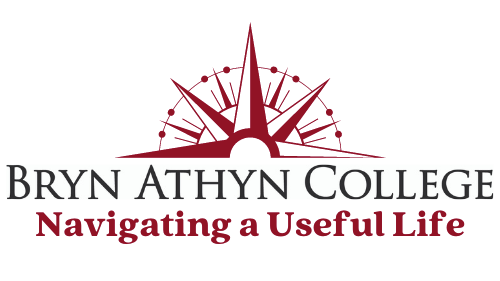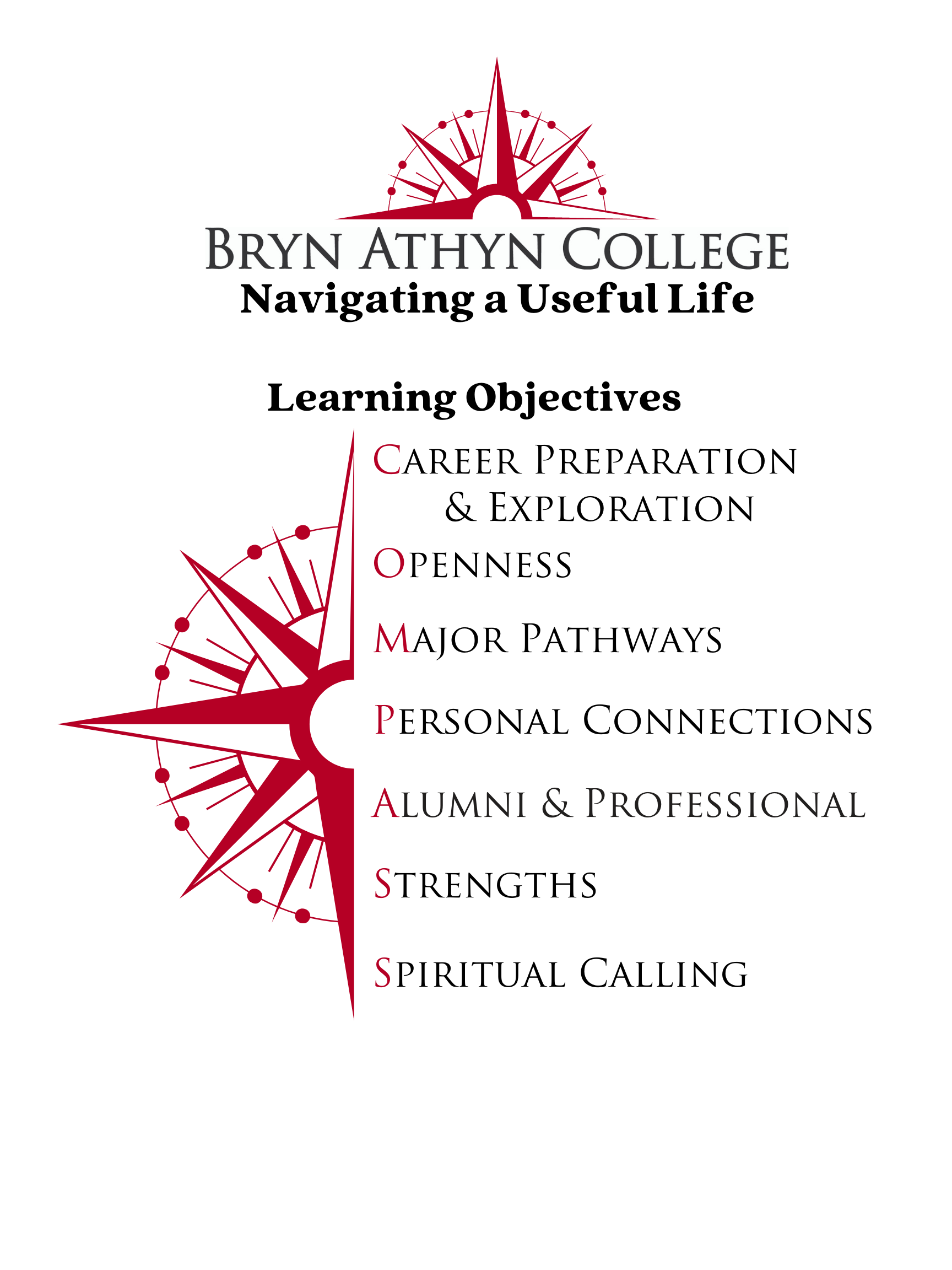About Navigating a Useful Life
 About the Program
About the Program
Navigating a Useful Life, a career and vocational exploration program, was designed by a committee of faculty and staff after the receipt of a Professional Development grant from the Network for Vocation in Undergraduate Education and Lily Foundation to focus on faculty/staff development during the 2019-2020 Academic year. The committee is excited to implement vocational exploration through the program, Navigating a Useful Life, with the receipt of a $50,000 program development grant for 2021-2023.
Bryn Athyn’s Navigating a Useful Life program prepares students for their life’s journey through intentional collaborations across campus that help students reflect on their own spiritual purpose as they explore major, career, and life pathways and develop relevant skills and perspectives. Our new two-year grant will enable Bryn Athyn College to pursue five initiatives to develop the Navigating a Useful Life program: provide release time for a faculty and staff member to lead the grant-supported initiatives, develop first- and second-year Navigating a Useful Life programming in the curriculum and co-curriculum, enhance Career Education and Development programming, further our expertise in the use of Clifton Strengths while establishing a Strengths Mentors program, and develop badges related to Navigating a Useful Life.
Program Philosophy
Central to Bryn Athyn College’s philosophy of vocation is the belief that there is a call communicated to all people by the Lord’s love and wisdom. Swedenborg emphasizes that each of us should aim to live a good, meaningful life of virtue, altruism, and love to our neighbors in useful service or practical piety. While not ignoring our natural needs, we should be motivated primarily by a sense of being useful to society, advancing the public good, serving our neighbors, and giving credit for this to the Lord. In this deeper sense, vocation is simply doing what you love to do.
Through a liberal arts education, students embark on a journey to discover how their talents and strengths line up with the needs of the world, and think critically about the meaning and purpose, and about the future direction of all facets of a person’s life. This journey does not always follow a straight path. Some students will encounter twists, turns, and challenges as they find their calling in life. A Bryn Athyn College education strives to help students navigate their choices and the kinds of love that fundamentally motivate their understanding and interest in a career.
There are some people who go through life feeling that they never really found their career niche, who migrate from one job to the next. Sometimes the purpose behind a more meandering path to one’s calling may have to do with the need to gather a variety of skills and experiences to prepare for an unforeseen important role later in life. The Lord’s leading and the overall coherence of our path often comes into focus in retrospect, in a way that often cannot be seen in the present as we wrestle with decisions about our next step.
Swedenborg’s teachings offer insight into the connection between the global call (our common human vocation to stop doing evil and start doing good) and our local call (to a profession or serving others in some defined manner, with or without remuneration). When speaking of our global or common vocation, we hope that everyone, no matter their station in life, can respond effectively to human needs; do what is good, right, and just in all interactions with the neighbor; and grow spiritually and morally as the means to live a good, meaningful life.
-Summarized from Dr. Dan Synnestvedt’s A Philosophy of Vocation for Bryn Athyn College of the New Church (August 2020)
COMPASS Learning Outcomes
Navigating a Useful Life is comprised of seven categories of Career Preparation & Exploration, Openness, Major Pathways, Personal Connections & Development, Alumni & Professional, Strengths, and Spiritual Calling. Navigating a Useful Life combines existing departmental efforts with new program outcomes to foster in learning and engagement initiatives for our students.
Career Preparation & Exploration
Students will be able to
- Define clear transitional goals (vocational, post-graduation, and career related) by the end of their junior year.
- Reflect on their own career preparedness and identify resources and tools needed to prepare for entering the job market and career advancement.
Program Examples
- Student Employment Program- SEP Job Fair (Sept 2019)
- Career Ed & Development- Career Day: Majors and More (October)
- Career Ed & Development- How to Ace the Virtual Job Fair with Anne Weisbord, President of Career Service Unlimited (May 2020)
Openness
Students will be able to
- Participate in different academic, work, and social experiences and to respond constructively to their calling in local, national, and international contexts.
Major Pathways
Students will be able to:
- Articulate the transferable skills from their BAC degrees to career opportunities through participation in “major-related” experiences prior to experiential learning opportunities.
Program Examples
- Career Education & Development- Where a psychology degree can take you, Madeline Cateriniccio, QPA, Director of Purchasing and Inventory at Middlesex College in New Jersey (Feb 2021)
- Career Education & Development- Where an education degree may take you, 11:10 -11:50 am- Amer Qatanani, Director of Blended/Distance Education with the College of Healthcare Professions in Texas (Oct 2020)
Personal Connections & Development
Students will be able to
- Successfully identify the importance of, and the challenges to, achieving a balance between the responsibilities of work and the responsibilities of family, nation, church, and world.
- Reflect on how to draw on their own values and sense of purpose in the work that they do [with a variety of other people].
Program Examples
- Career Education & Development- Diversity and Inclusion: Trashing your Ego, Brickman - Panel of speakers from Philadelphia’s American Paradigm Schools (Jan 2020)
Alumni and Professional
Students will be able to
- Participate in networking opportunities within BAC’s extensive professional network through faculty, staff, alumni, the New Church Career Network, and LinkedIn to explore career options that may or may not been considered.
Program Examples
- Career Ed & Development- Career Day: Majors and More (October)
- Career Ed & Development- “Resume Refresh” - offered a remote session with a resume coach for BAC students and alumni (May 2020)
Strengths
Students will be able to
- Use their Top 5 Talents to help develop self-awareness about how to use their talents within the classroom, working with others, and articulation of career goals and aspirations.
Program Examples
- CliftonStrengths Workshops at New Student Orientation
- CliftonStrengths Lessons in Positive Psychology, introduction to Leadership, and RA/PAL Trainings
Spiritual Calling
Students will be able to
- Use New Church (Swedenborgian) teachings to develop a spiritual perspective on their career and preparing for an active life of use.
- Articulate the connection between spiritual development and their local and global calls. Using New Church terms, this means that students will be able to articulate the connection between regeneration, charity, and use.
Program Examples
- Friday Morning Live Chapel
